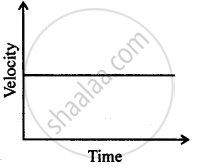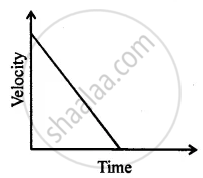Advertisements
Advertisements
Question
A train starting from a railway station and moving with uniform acceleration attains a speed 40 km h−1 in 10 minutes. Find its acceleration.
Solution
Here, initial speed, u = 0
Final speed, v = 40 km h-1
= `(40 xx 1000)/(60 xx 60)`
= 11.11 ms-1
Time taken, t = 10 × 60s
= 600s
Acceleration,
a = `(v - u)/t`
= `(11.11-0)/600`
= 1.85 × 10-2 ms-2
APPEARS IN
RELATED QUESTIONS
Define velocity. What is the SI unit of velocity ?
A boy is sitting on a merry-go-round which is moving with a constant speed of 10 m s−1. This means that the boy is :
When a car driver travelling at a speed of 10 m/s applies brakes and brings the car to rest in 20 s, then retardation will be :
Give one example of following motion :
Variable acceleration
A bicycle initially moving with a velocity 5.0 m s-1 accelerates for 5 s at a rate of 2 m s-2. What will be its final velocity?
Write three equations of uniformly accelerated motion relating the initial velocity (u), final velocity (v), time (t), acceleration (a) and displacement (S).
Multiple choice Question. Select the correct option.
The speed of a car reduces from 15 m/s to 5 m/s over a displacement of 10 m. The uniform acceleration of the car is :
Can you suggest a real-life example about the motion of a body from the following velocity – time graph?

Can you suggest a real-life example about the motion of a body from the following velocity – time graph?

Two stones are thrown vertically upwards simultaneously with their initial velocities u1 and u2 respectively. Prove that the heights reached by them would be in the ratio of `"u"_1^2 : "u"_2^2` (Assume upward acceleration is –g and downward acceleration to be +g)
